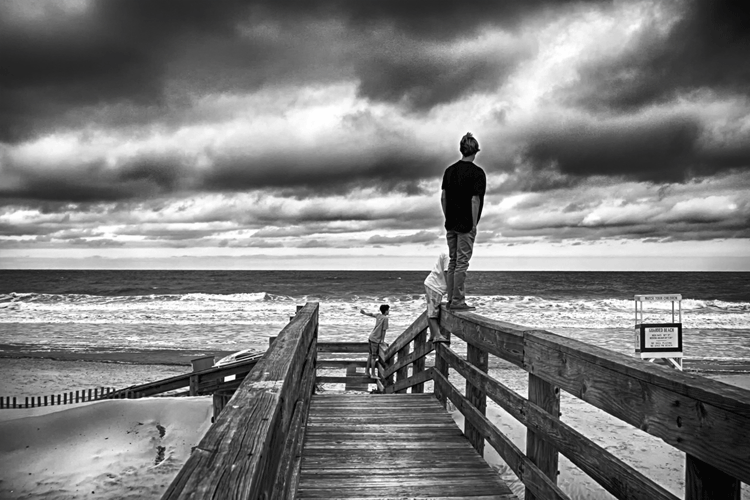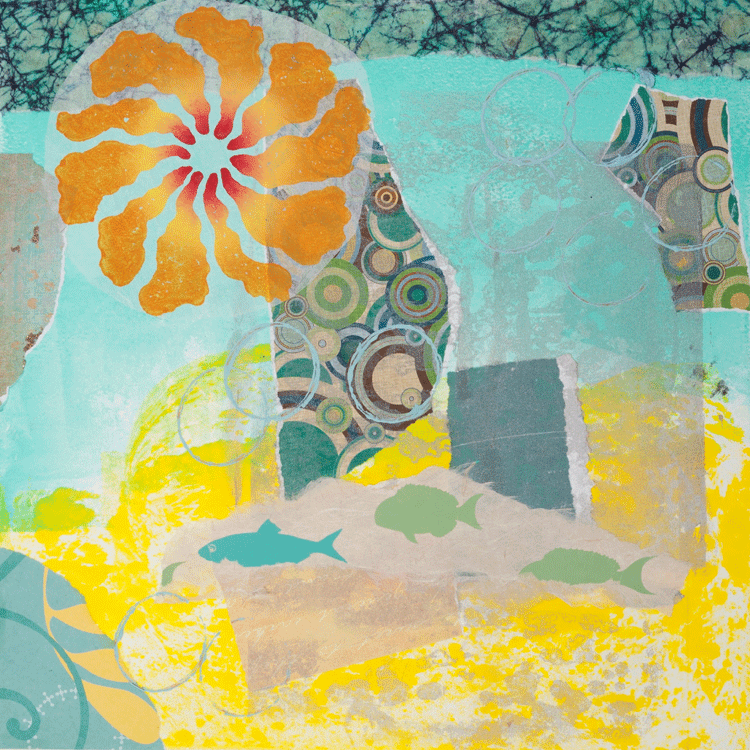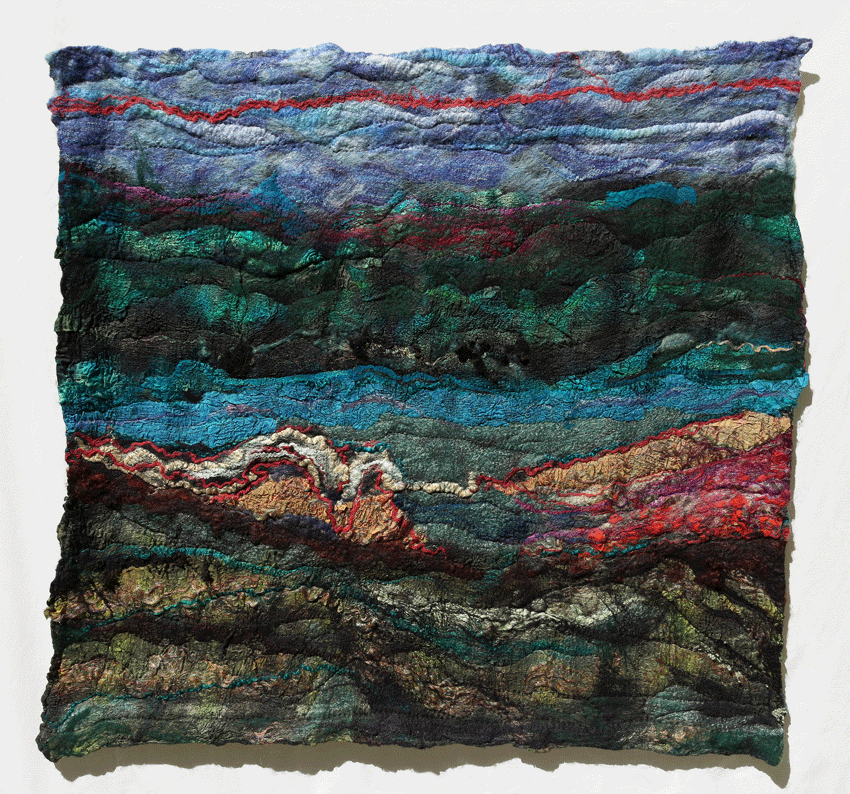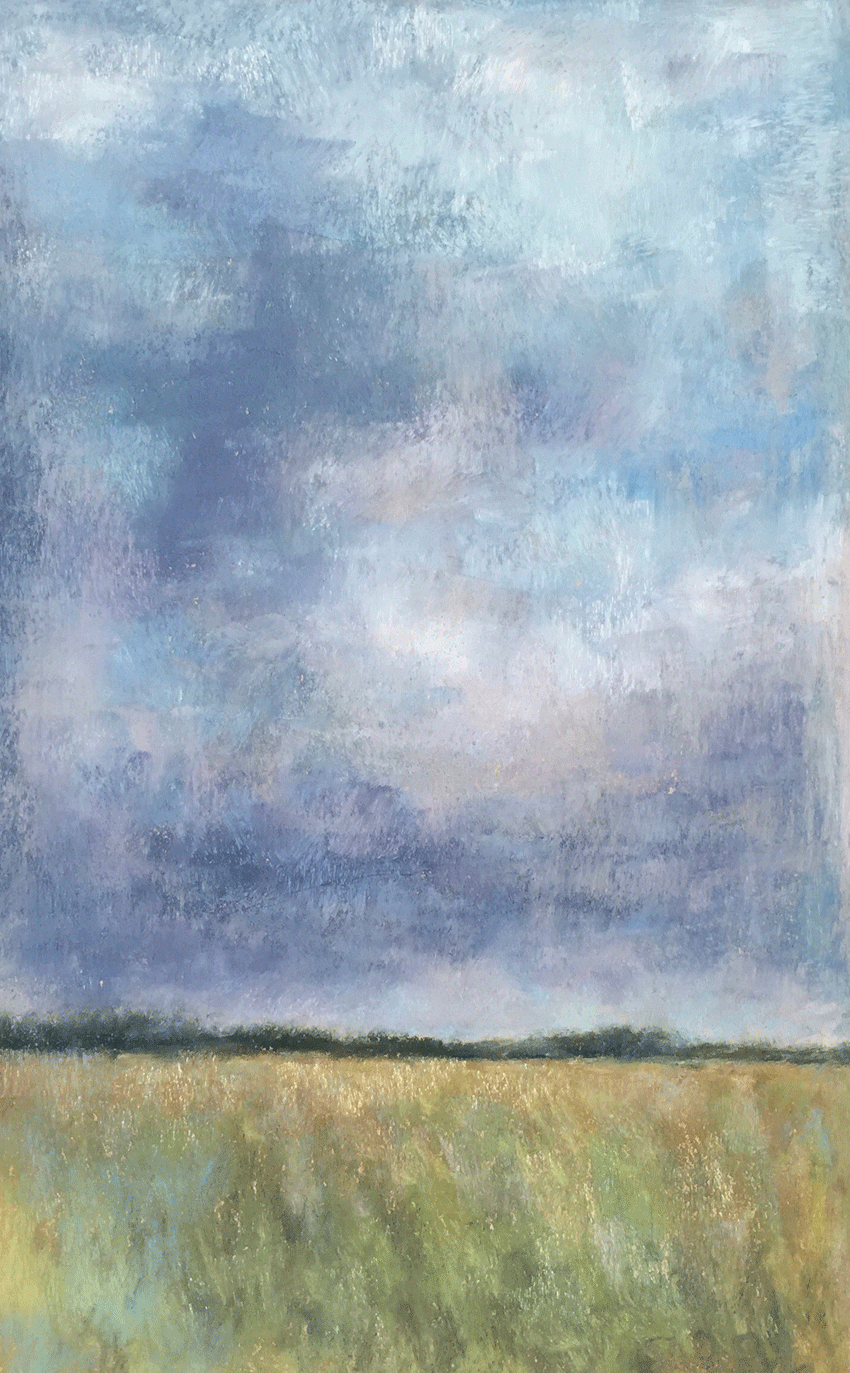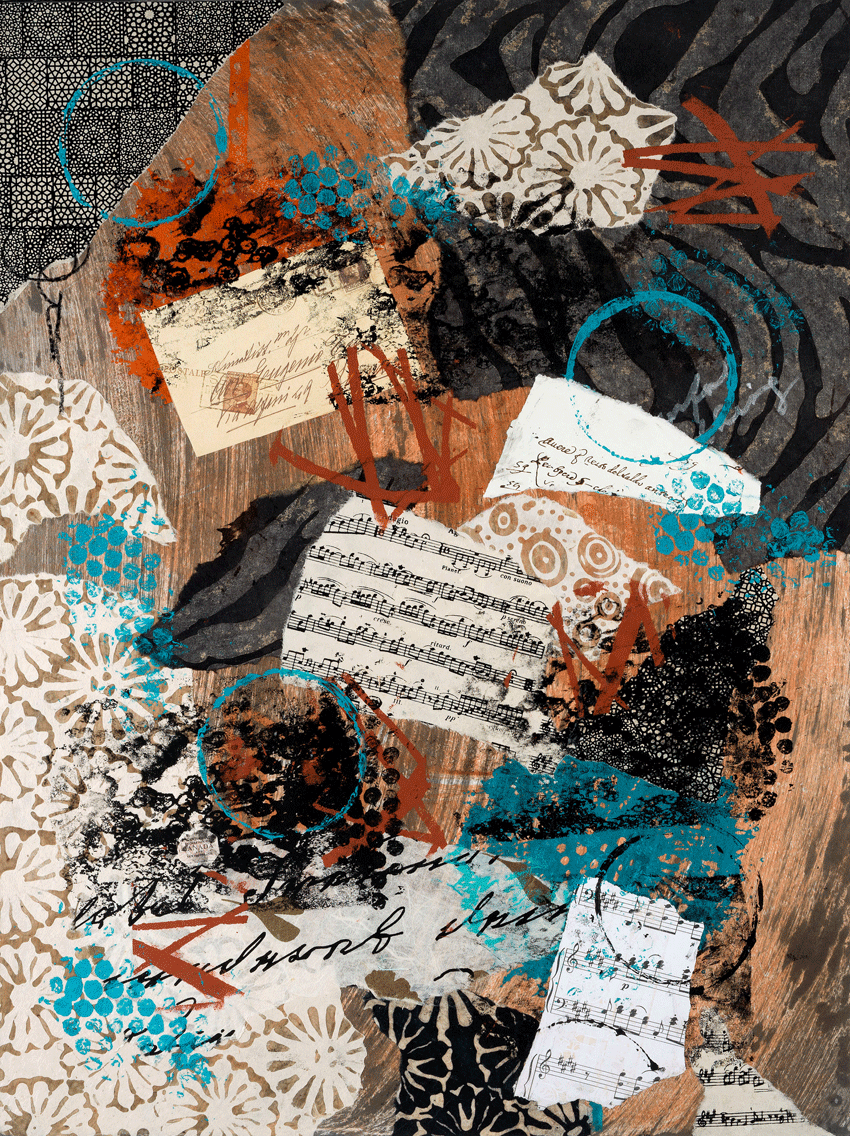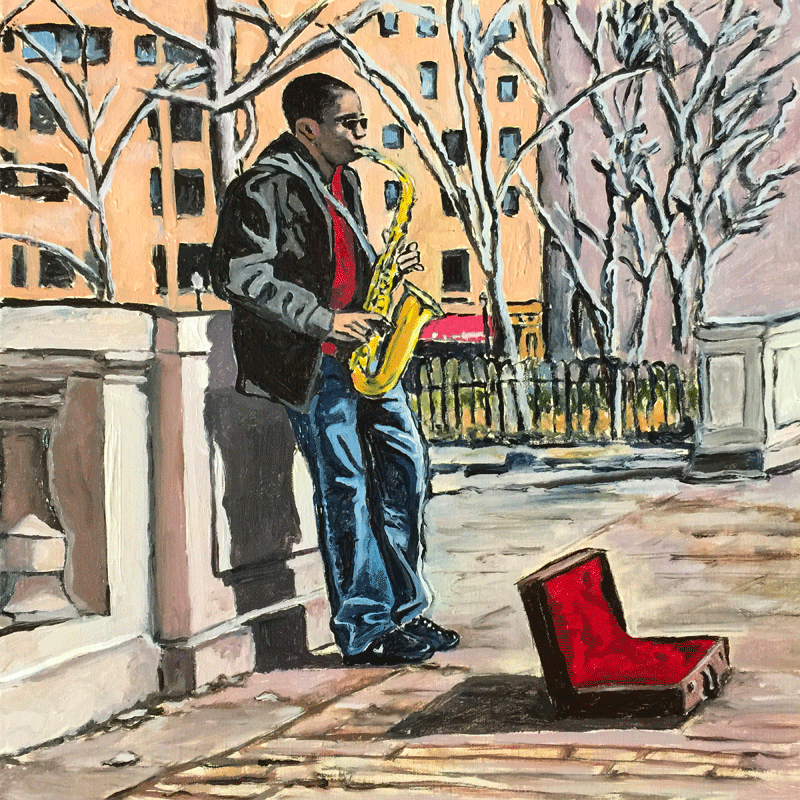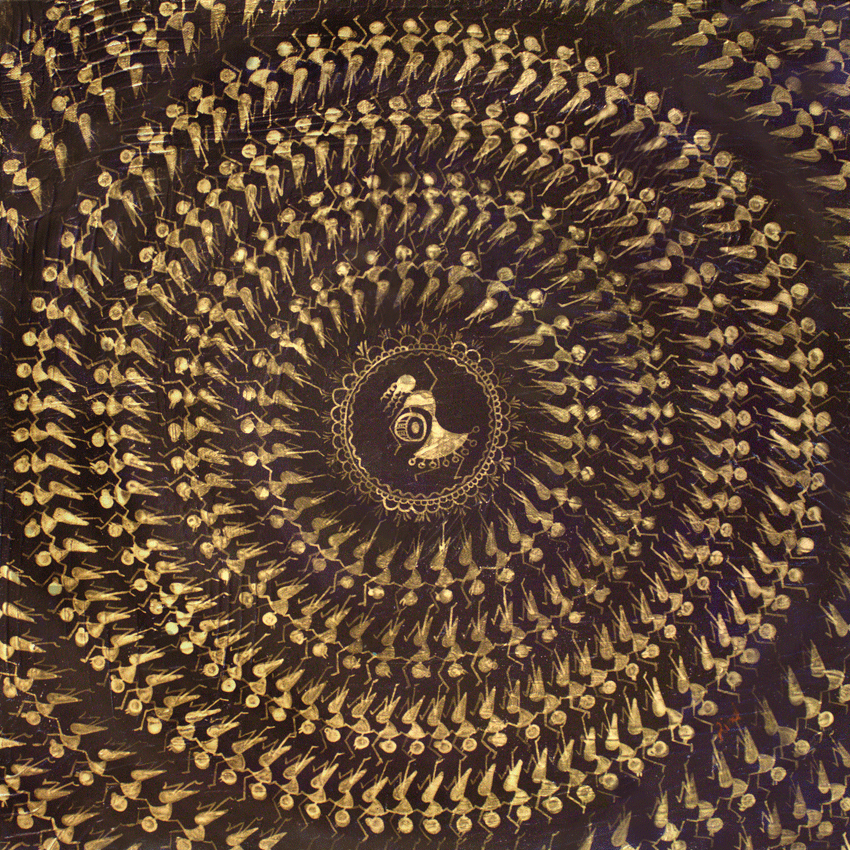
Leslie
By Lauren Green
Michael leans over to flick off the heat, catching a whiff of Rick’s half-eaten apple in the cup holder. He had thought the fling with Rick would last maybe a night or two, a week at most. Fifteen months later, they are driving home to see Michael’s ex-wife, Leslie, who is throwing herself an end-of-life party.
In the passenger seat, Rick extends his arms overhead and spells out O-H-I-O, not for the first time this trip. Michael knows that Ohio means little to Rick, who has spent all twenty-four years of his life in New York City, where Michael met him at a tacky Chelsea bar called Rawhide.
“Did you know there’s a river here that’s flammable?” Michael asks.
“Huh?”
“The Cuyahoga. It’s so full of pollutants, it once caught fire. Literally.”
Rick snorts, the way he does whenever he finds something either amusing or lame. Which category his latest fact falls into, Michael is unsure. He sets his gaze ahead into the dark once more, where a sliver of moon lances through the lacy canopy of sycamores that line the roadside.
Leslie had been sick once before, long ago. She had revealed this to Michael on an early date—how she spent her fourteenth year propped-up in bed, teaching herself card tricks from a paper booklet while doctors pumped her body full of poison. By the end of summer, the whites of her eyes were tinted blue, like sky reflected in a corner of windshield, and she could levitate the queen of spades.
And now she is dying. Second cancer—that’s what she called it on the phone. Not a recurrence but a separate entity altogether. Michael was in his office at the YMCA when she rang. As her voice floated toward him, he imagined her in their old kitchen, worrying the landline cord into a coil between her fingers, crossing one shea-buttered ankle over the other.
“Come,” she said. “I mean, if you want. If you still love me—” she said, but she did not finish the sentence.
The end-of-life celebration seemed somber and hellish to Michael, who possessed no desire to return to his former existence. “It’s not exactly like she’s ever been the life of the party,” he grumbled to Rick. Life of the party. The words were like tinfoil against his teeth.
But Rick insisted he go, and offered to accompany him, most likely in the hopes of purloining some medical cannabis. So it was decided.
Michael casts a sidelong gaze to the passenger seat. A deep red scar vitiates Rick’s cheek where he cut himself shaving this morning. “Arizona,” Michael says.
“What?”
He gestures to the license plate of the white semi-trailer looming like a cloud in the distance. “Arizona.”
“Oh, nice catch.”
Rick drapes his jacket over himself like a cloak, wriggles it up to his chin. His head lolls to one side. Blue-black twilight peeks through the lines on the window glass where he’s fingernailed away the frost. “It’s so boring here,” he says, his voice husky with sleep.
“Ah, my sweet city boy. Welcome to most of America,” Michael answers. He waits for the reward of Rick’s quick snort, which does not come.
Nighttime bounds across the highway and far into the plains. Darkness spreads over the soybean fields and hoods the silver Camry. Michael’s thoughts drift to Leslie. Leslie in bed, late at night, waiting for him to come home. Leslie tracing shapes on the driveway with a twig, because she cannot bear to watch him pull away.
A car streams around them, blaring its horn, and he swerves back into the right lane. Beady red taillights glare out at him from ahead. “Maryland,” he reads. “Did we already get that one?”
He glances over at Rick, who has lapsed into sleep. Outside, wintry currents howl. Michael reaches over, turns up the heat, and tries again to think of her.
*
The rules to Leslie’s party, which she emailed out to her twenty-five or so guests, are simple:
- No using the words death or cancer or, god forbid, tragedy.
- No cell phones. (Photographs are O.K.)
- Obviously I don’t expect this to be the most uplifting event of your lives, but try to indulge me with a smile if you can. (Though if/when I need to cry, please do not judge me.)
*
The roads grow more familiar. Michael spots the Sunoco station he and Leslie used to frequent each time they drove to the airport, the mossy bog they would meander around when spring fever spiked, the convention center where he got down on his knees for a man whose name he didn’t know.
He nearly misses the turn onto his own block, the one he took every day for twenty-two years. He passes the Claffeys, the Morgans, the Haberfields, slowing as he approaches the stone-and-stucco house that once belonged to the Fletchers. A “For Sale” sign gnashes its long white fangs into the overgrown yard.
The Fletchers, a young Waspy couple, had moved onto the block eight years ago. With their incongruous Ivy League airs and tinted Range Rover, they were instantly the subject of town gossip. Both boasted mystifyingly perpetual tans, which they emphasized by dressing exclusively in country-club pastels. They had one child, a flaxen-haired toddler named Jacob. Michael and Leslie sometimes watched Jacob through the window as he raced his Tonka steel cement mixer up and down the drive.
“Why isn’t anyone out there with him?” Leslie would ask. “Someone should be watching.”
One day, Mr. Fletcher strapped Jacob into his car seat and drove to the reservoir on the outskirts of town, where teenagers ventured in the gauzy days of July to get lucky. The reservoir was two miles long and sixty feet deep—lightless and shimmering as a water moccasin. Later, the skid marks would indicate that Mr. Fletcher didn’t even brake—he drove full speed ahead into the water, which swallowed the car in several large gulps, down into the belly of that glimmering black.
For nights after the tragedy, Rachel Fletcher’s wails kept Michael and Leslie up at night. When they passed by her in the supermarket, her grief seemed otherworldly. Her eyes shifted frantically in their sockets, as if her pupils were an etch-a-sketch trying to erase what they’d seen.
Her name became shorthand for any pain too great to bear. When Leslie’s father died of heart disease: Rachel Fletcher. When Michael was laid off: Rachel Fletcher. On that final day, when his car was packed, and he drove away, watching Leslie grow smaller in the rearview: Rachel Fletcher, Rachel Fletcher, Rachel Fletcher.
Rick rubs the sleep from his eyes. “This it?” he asks, taking in the abandoned house.
“No,” Michael says. “Next one.”
The house looks smaller than he remembers as it materializes behind a scrim of trees. A single light glows firefly-yellow through the kitchen window. “Maybe you should stay here,” he says.
Rick shrugs. “It’s not like she doesn’t know I’m coming.”
“Right, but—”
Rick squeezes Michael’s thigh. “It’ll be fine.”
Into the nettled gulley behind the yard Michael stares, waiting for his headlights to catch on a pair of gleaming eyes or the scales of a leaping fish. He is considering restarting the car and checking into a motel when Leslie appears backlit in the doorway, a pilled cardigan sashed loosely around her middle.
“Hey, stranger,” she calls.
Crisp air. A breeze carting the smell of rainwater across the drive. Leslie waits on the landing, grinning with what Michael imagines to be painkiller-induced joy. He walks to her and wraps her in a hug. She is all bone beneath his fingertips. With her mouth still nuzzled into his neck, he shyly cups the back of her wigged head.
Footsteps behind him, and he pulls away. “This is—”
“Rick.” Leslie extends her hand. “So nice to meet you. Come in. Ignore the mess. I’m trying to get everything set for tomorrow.”
She ushers them into the kitchen. Moonlight has pooled on the ground beneath the French patio doors. Michael’s eyes flicker to the frames on the wall—Leslie riding the Raptor at Cedar Point, arms thrust into the air; Leslie at her nephew’s wedding, face dewy and wide. He tries to reconcile the woman in the photographs with the one before him now, her pallid skin impressed with a filigree of purple veins.
“Long drive?” she asks, collapsing into a cushioned chair. She rubs the back of her palm against her forehead, smudging one penciled-in eyebrow. “Can I get either of you a drink?”
“I’ll take a soda,” Rick says.
“Pop,” Michael reflexively corrects. “I’ll get it.”
He pads to the pantry. The shelves are stocked for tomorrow’s party with foods the Leslie of his memories would be loath to purchase: chips, candy, soda, beer. Michael fingers the plastic rigging between the cans. Leslie used to complain the rings were an environmental hazard, liable to pollute the Atlantic, strangle its precious sea turtles. What should she care for oceans now?
He takes a few breaths to fortify himself before striding out, a false smile plastered across his face. In the kitchen, Rick stands bathed in the refrigerator’s planetary light, wielding a bulbous head of ginger.
“It’s for me,” Leslie explains.
Michael cocks his head. His wife is gone, but here is this woman sitting in his wife’s chair, wrapped in his wife’s freckled skin, wearing the same kind and weary mask.
“Soda?” Rick asks.
Michael tosses him the can and clocks the snap of the tab, the hiss of the fizz. He has forgotten how eerie suburban silence can be. Rick tips back his head and allows the liquid to stream out. With alarming strength, he crushes the can in one fist and sets its flattened body down on the marble countertop.
“Do you need help setting anything up for tomorrow?” Michael asks Leslie.
“Mmm,” she says, “I think I’ve got it under control. My mom’s been staying here, so she did most of the setup. I just need to finalize my outfit.”
“Can we see it?” Rick asks.
Leslie pauses a moment, then labors to her feet. “Sure. Just give me a minute. I’m slow going up.”
She shuffles across the hardwood floor. Michael waits for the mouth of the hallway to devour her before shooting Rick a reproving look.
“What?” he says. “Chill.”
Michael shakes his head, trying to slough off the annoyance that has come over him. “Here. Let me show you the rest of the house.”
He leads the way from the kitchen, flicking on lights as he goes. In the dining room, he is overcome by the urge to yank open every drawer, catalogue each article she will leave behind. He spots her favorite vase on the topmost shelf of the china cabinet. The vase is turnip-shaped and gray; the romantic color of a drizzly Paris, Leslie used to say, though she had never been there. Michael grips it by the neck and uses his shirtsleeve to swab dust from around the rim. He positions it in the center of the dining room table.
“Look at this!” Rick calls from the living room, where Leslie’s mother has arranged a semi-circle of folding chairs. Streamers festoon every surface. Rick stands before a bridge table set off to one side, studying the objects arrayed on its surface. A sign scrawled in Leslie’s trembling hand reads: DON’T BE SHY! HELP YOURSELF.
Michael runs his fingers over the keepsakes: Leslie’s porcelain hand-mirror; her camera; a set of earthenware bowls; a watercolor of a rose with her initials in the corner. He is about to turn away when he catches sight of a familiar glass bottle, dangling from a silver chain. The bottle is the size of his thumb and filled with pink sand from the beach in Greece where he and Leslie spent their honeymoon.
He pinches the chain and lifts it into the air. The coral granules tumble from one side to the other. He had gifted Leslie the necklace on their third anniversary. He closes his fist around the glass and worms it into his pocket. Sensing Rick’s eyes on him, he looks up. They stare at each other, soundless and unmoving.
Just then, the patter of Leslie’s footfalls jolts them. “Where did you boys run off to?” she calls, and the kettle in the kitchen begins to sing.
*
Michael remembers little from the honeymoon. Only the tract of sky at sunset—febrile, the color of a skinned tangerine. The sizzle of his feet against alleyways once strode upon by emperors. A donkey clopping up the cliffside stairs, suitcases adorning his back. He remembers the day he walked down to the beach alone. Leslie, sick with sun fatigue, had headed back to the villa early.
Even now, he can picture the tanned face of the young man folding umbrellas on the sand. Flushed cheeks, vacant brown eyes. Hardly more than a boy. He can recall the precise weight of the drachma banknote which he slipped beneath the man’s belt before gesturing lewdly to his own crotch. The man said the word in Greek. And then he took Michael into his mouth. Brown eyes, vacantly upturned, registering Michael’s pleasure with each movement—how those eyes would torment Michael every day for the next twenty-two years.
When it was done, Michael sat down in a web-strap beach chair and regarded the man with the disdain he reserved for the people who reminded him of his most monstrous self. The man finished folding his umbrellas and hurried back up the path, whistling.
*
When Michael and Rick reenter the kitchen, the room is dark. In the silvery moonlight, Leslie’s edges are feathered, as though she’s been done in crayon. She stands, arms crossed, wearing a red silk gown that Michael recognizes. Years ago, she had shown him a picture of it in a magazine. They’d squabbled over its price. I just want to feel beautiful, she had said.
Why hadn’t that been enough?
“Can one of you get my zipper?” she asks, walking toward them. She lifts the synthetic hair away from her neck. Rick tugs the zipper up its track, his hand hovering at the clasp.
She spins around. “What do you think?”
Rick lets out a long, slow whistle of approval.
Leslie scans Michael’s face. “It’ll be better with makeup,” she says.
The walls of his throat swell. He fights to level his eyes on hers. She suddenly feels both very large to him and very far away, like a city glimpsed through an airplane window. “You look ravishing,” he says.
He has the desire to offer something more, but every word that comes to mind seems trite. They stand in silence until, at last, Rick clears his throat.
“It’s late,” he says. “I’m gonna turn in.”
Leslie nods. “I’ve set you up in the guest room, just up the stairs, first door on the left.”
“Cool, thanks.”
Rick swings his backpack over one shoulder and slinks toward the staircase. He has a dancer’s physique, his slim hips swaying to the tempo of unheard music. After a few moments, Michael and Leslie tilt their heads up toward the ceiling, where they hear Rick moving about in the room above.
“He seems nice,” Leslie says. She crosses to the sink to put away the dishes, humming to herself a tune that is more breath than music, impossible for Michael to place.
“I’ll get those,” he says.
“They’re already done.”
She shuts the cupboard and wipes her hands on a balding rag. “So, what’s he getting out of this?”
Michael opens his mouth, closes it. He thinks of Rick, of his youth, his boundless energy, the rainbow-pride flag in his apartment that hangs in place of a window curtain. He thinks of the night they first met. Michael had worn a too-tight paisley shirt, which pulled between his shoulder blades. Uncanny taxidermy fixtures jutted out from the wooden pillars overhead. Shot glasses sweated on the ebony bar. Rick stood in the center of the room, pretending to rope the mechanical bull with an invisible lasso. Watching him, Michael felt a judder within and placed a hand over his heart; he had forgotten what this muscle could do. Later, they kissed beneath the bristled snout of a boar, whose marble eyes kept vigil over the crowd. Rick tasted of pizza. In a faint Colombian accent, he asked, Top or bottom, Cowboy?
Recalling the line, Michael feels the tips of his ears burn. At the start, he had liked how both he and Rick were, in their own ways, beginners, and how Rick, at twenty-four, had never known a single person who’d died, not even a grandparent. He liked how Rick called him Mi corazón—my heart.
Michael is about to perform some artful version of this story (he will leave out the mechanical bull), when he notices that Leslie’s hand has paled on the countertop. The fabric around her middle dimples into shadow as she doubles over.
“Hey, hey.” He rushes forward and pries up her fingers one at a time. She yields to his touch as though she is boneless, made of water. “I’ve got you,” he says, cinching a firm arm around her waist.
*
For so long, the cheating had seemed almost too easy. Leslie never questioned why Michael decided to take up piano as an antidote to middle-age malaise (nor why he insisted on biweekly lessons with Jonathan Claffey, the neighbors’ son). She never questioned the stained underwear that she found beside the gulley, which Michael said must have belonged to one of the hooligans who egged the Fletcher house. Only once did she inquire why Michael had grown so distant at night, and whether he might consider seeing a specialist for his “problem”.
Perhaps he could have kept the charade up indefinitely had he and Leslie not run into one of his ex-lovers at the Cinemark—a striking man of Irish stock, whose fair skin blushed as Leslie introduced herself as Michael’s wife. “I didn’t realize,” the man said. And Michael surprised himself by smiling, soused with sudden relief at discovering his lie had reached its miserable conclusion.
He and Leslie did not view the movie. Instead, they walked solemnly out to the car. Popcorn grease lingered on their fingers and in their clothes, a smell that struck Michael as deceptively warm and comforting. “I wish you’d thought about me,” Leslie said, “the position this puts me in. I feel like my entire life, my entire life—”
He waited, braced, but she did not go on. At the stoplight, he turned to face her, his throat gummed with excuses. The expression that met him was blank, cordial—the expression one might give to an elevator attendant after providing their floor number. How had she managed to so swiftly squirrel away whatever intimacy lay at her surface?
The light turned green. So tremendous was the shock of the moment, even the power of instinct could not compel Michael to drive on.
“What do you want me to tell people?” she demanded.
“Sorry?”
“I mean, do you want me to tell the truth, or what?”
He sieved through the simple kindness of her question, hoping to catch something sharp lurking in its depths. “Tell them whatever you want,” he said scornfully, tears pricking his eyes. This was what he’d wanted all along, he told himself. Leslie laced her fingers with his over the gearshift, her tender grip conveying the magnitude of her love. Michael did not know how a person could be so good.
*
Upstairs, Michael lays Leslie down on the bed they once shared. She does not sink into the mattress so much as lie with her back carefully touching it, the two surfaces adjacent but wholly discrete. A vanilla candle masks a rotten odor that reminds him of Rick’s apple, still sitting in the cup holder. On the bedroom carpet, Leslie’s slippers have impressed a trail of tiny circles, like pawprints in snow.
“Will you get the light?” she asks.
He does. In the darkness, he fumbles to the bed, sits at its edge with his head hung and his hands clasped in his lap. He hears Leslie’s effortful breathing behind him. “Do you need me to get you anything?” he asks.
She runs her hand over the space beside her, smoothing the wrinkled sheets. “Lie down, will you?”
He climbs into bed, careful not to pull the silk of her dress. His body commas around hers. She is smaller than he remembers. The warmth that radiates through her back is shocking. For a moment he wonders if the doctors have it wrong, if she is not near death at all.
“Wait,” she says. “Shut your eyes.”
“Okay.”
“Are they closed?”
“Yes.”
The mattress shifts. Michael hears a faint rustling and the clacking of bobby pins against the nightstand. He imagines Leslie’s buzzed head like that of a baby chick’s, frosted in down.
She sidles closer to him. With strained delicacy, her fingers trace the curve of his chin. The touch tickles, and he wills himself not to draw back. “Your beard,” she says. “It’s silver now.” She stalls, then slowly leans in to kiss him. Her lips are chapped, ridged with flaking skin. Pulling away, she nestles her head into his chest.
Just then, Michael hears the floorboards creak and glances up, startled. A shadowy figure stands in the half-lit doorway. Rick. He spins and makes a hasty retreat.
“I should go,” Michael says.
“Wait.” Leslie prayers her hands beneath her head. “Stay.”
Michael furtively reaches up and pats his beard, as if trying to recollect her touch. Groggily, he rolls from the bed. “Give me a minute.”
He plods down the hallway. The light in the guest room is on. His mind fills with a vignette of Rick repacking his toiletry case, sliding his feet into his loafers, readying himself to leave. He imagines placing a hand on Rick’s chest to stop him, explaining the gossamer-thread sort of love that sprouts in the corners of a marriage, where neither party thinks to look. Why can’t I love you both? he hears himself beginning. And then Rick’s telltale snort, a shove; Rick saying Michael is nothing but a foolish, dirty old man.
In abject supplication, Michael opens the door. He is surprised to spot Rick at the window, hands balled into the pockets of his jeans. “What are you doing?” he asks.
“Thinking.”
Michael strolls over to him, so they are mere inches apart. Rick is a head taller, at least, and more muscular. Panic constricts Michael’s chest, as it does when he walks past someone on the street he knows could hurt him.
“How is she?” Rick asks. He is standing so close, Michael can make out the golden flecks in his wrinkleless eyes, the scar on his chin where he scratched at a chicken pock as a boy.
Michael purses his lips. He waits, trusting that Rick will uncover the answer he cannot provide.
Rick nods and gestures to the window. “Look.”
The first thing Michael catches is his own vivid reflection, projected on the glass. Approaching dawn has lacquered the world beyond pink. Clouds scud across the lightening sky. Rime cloaks the winterweed. A birds’ nest rests precariously in a tree.
Rick takes hold of Michael’s hand. Gently, he guides him back to the door. Michael remembers how, as a child, his father used to walk him to the bus stop at the end of the road each morning, where the other St. Jude’s boys constellated in their woolen gray uniforms.
Rick gives Michael’s hand a hard squeeze. “Go. She needs you now.”
*
The morning Michael set to leave Ohio, exactly two years before Leslie phoned his office at the YMCA, he paused in the kitchen by the French doors, wondering how he got here. Just yesterday, it seemed, he was a teenager inching his pinky along the veneered church pew toward the pinky of the boy beside him, his lips moving around the words to “How Great Thou Art”. The next thing he knew, he was at the altar, peering into Leslie’s eyes, and then, in a blink, he found himself middle-aged, with back pains and a mortgage and a problematic hairline. The years were glued together, and he could not unstick them.
The previous evening, Leslie had sunk down to their bedroom floor, wanting to know if it was her fault. He asked why it needed to be anyone’s fault. But she was hurt and looking for somewhere to set down her blame. So he said, “No, it’s me. I should have told you sooner. I was embarrassed, I guess.”
“You guess,” she repeated numbly.
They did not kiss, but they apologized, each saying, Sorry, I’m sorry, over and over, until the words lost their meaning. She cried, and maybe he did too, though in his memory he hadn’t. In his memory, he held her, and she sobbed into his shirt, and then it was morning, the house quiet and drenched with sun. Michael saw the kitchen as though for the first time, and imagined what it would be like without him here.
Leslie entered in her dressing gown. “Are you ready?”
Out to the car they stumbled, with Michael lugging the last of his boxes. He loaded them into the trunk while Leslie stood to the side. She wanted to witness his departure for herself, she said. Otherwise she might wake up in the middle of the night, expecting him to return.
“I’ll see you,” he called, as if he were setting out for the supermarket. At the end of the drive, he turned back and gave a final wave.
Exit signs studded the highway. At each one he thought about pulling off, returning home. He drove and drove, until the world stopped looking like a place he knew. He drove until his body ached and he couldn’t see straight. Then he parked the Camry on a corner in Queens, where the whir of cars travelling in and out of the city lullabied him to sleep.
*
When Michael returns to the bedroom, Leslie is asleep. He crawls beside her, watches her papery lashes flutter as she drifts in and out of dream. As he lies there, he feels something dig into his back. He reaches beneath him, and his fingertips land on the smooth edge of the sand bottle. He turns it over. The pink grains stream from one end to the other, as if keeping time in an hourglass. He sets the bottle on the nightstand, beside Leslie’s wig.
She stirs. “Everything all right?”
“Yes. Go back to sleep.”
She curls her legs beneath her. Her eyes are wet and shining, her teeth chattering.
“Are you in pain?’ he asks.
“A little. The hospice nurse will be here in the morning.”
His stomach churns. “How bad is it?”
The room is quiet, save for Leslie’s wheezing. Michael waits, wondering if she’s fallen back asleep. But then, at last, the corners of her lips curl. She does not say it, but the words hang in the space between them: Rachel Fletcher.
She yawns. “Wake me if I fall asleep, all right? I want to watch the sunrise.”
“Sure.”
“I wish it were summer.”
“We can pretend.”
With a sigh, she reaches over and clings to his sleeve. “Thanks for coming.”
“Of course,” he says, aware of her pulse beneath his fingertips, steady but faint. As the sky above them fills with light, the window blinds parse the sun into ribbons that fall goldenly across the sheets. “I wouldn’t miss it.”
Lauren Green currently lives in Austin, Texas, where she is a fiction fellow at UT’s Michener Center for Writers. Her fiction has appeared in Glimmer Train and Conjunctions, among others. She recently graduated from Columbia University, where she was awarded the Louis Sudler Prize in the Arts.
